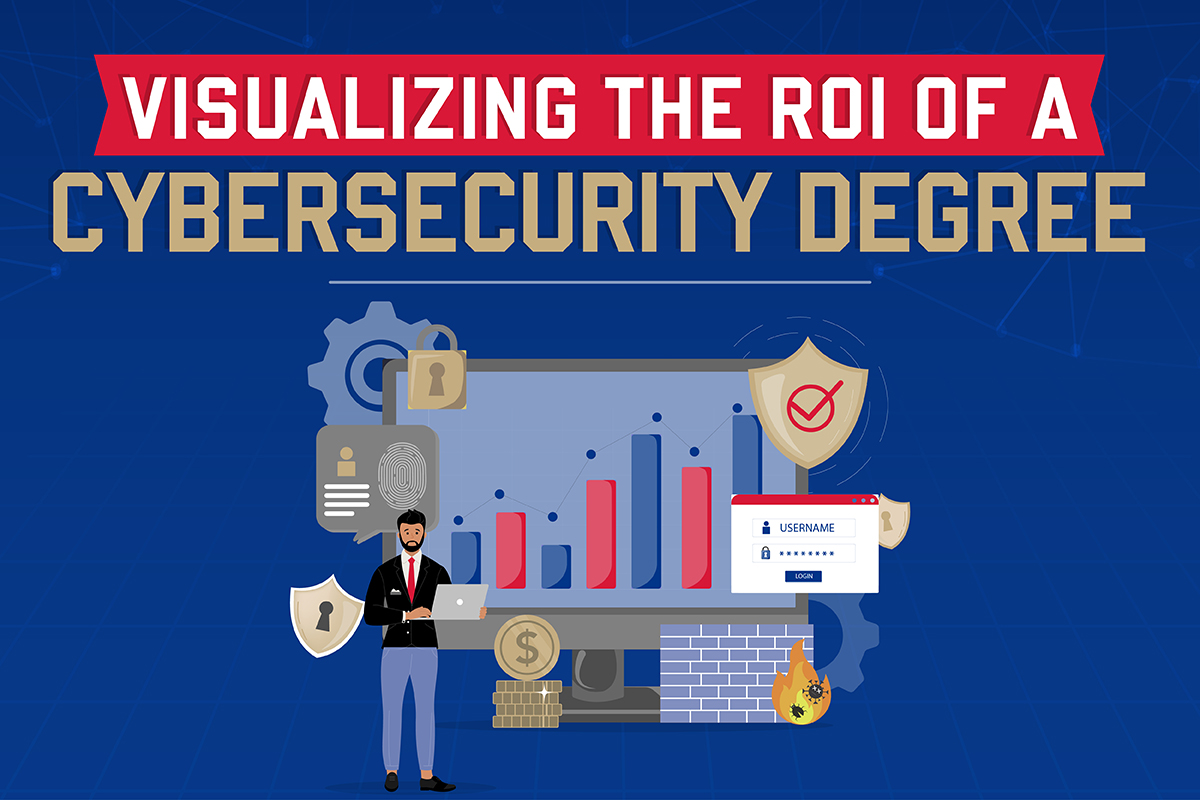Software Engineer vs. Cybersecurity Specialist
Written by:
University of Tulsa
• Jul 29, 2024

The technology industry continues to grow, and technology jobs are projected to increase twice as fast as overall employment over the next decade, according to the U.S. Bureau of Labor Statistics (BLS), as cited in CompTIA’s State of the Tech Workforce 2024 report.
Cybersecurity and software development roles rank among the top three technology jobs by growth. CompTIA projects 267% job growth for cybersecurity analysts and engineers and 225% job growth for software developers and engineers between 2024 and 2034.
Software engineering and cybersecurity have different focus areas and goals, but students considering the two fields may be unsure of the specifics. Here, we’ll compare the software engineer vs. cybersecurity specialist roles, as well as the education and experience needed for success in these roles.
What’s a Software Engineer?
Mobile devices and networks rely on software to operate. Software engineers ensure that software applications meet user needs and function as intended.
As experts in the software development process, these engineers play a critical planning role. They analyze user needs, design software plans, and determine the order of work. After the planning process, software engineers develop, test, and debug new software. They also monitor existing programs to design and implement improvements.
Effective software engineers bring strong technical knowledge to their role, which also requires exceptional problem-solving skills.
Software Engineer Job Duties and Skills
The job duties of a software engineer include the following:
- Designing software programs and creating project plans
- Coordinating with software developers and programmers to code projects
- Testing and debugging software programs
- Identifying improvements for existing software to address potential problems or weaknesses
Programming skills are critical for careers in software engineering. In particular, software engineers typically know one or more C languages, Java, Python, and other object-oriented programming languages. They also use software development tools, such as the software testing tool Selenium and the code editor Visual Studio Code. Finally, strong communication skills help software engineers coordinate with technology teams and document the software development process.
What’s a Cybersecurity Specialist?
Cybersecurity specialists keep sensitive data secure. They design and implement disaster recovery plans that prioritize prevention. To prevent a data breach, cybersecurity specialists conduct tests to identify potential vulnerabilities and implement new procedures or systems to minimize the risk of unauthorized access. If a breach occurs, they identify the extent of the attack and limit the harm caused by corrupted files or data loss.
To safeguard networks and systems, cybersecurity specialists need a deep understanding of information technology (IT) security and infiltration tactics used by hackers.
Cybersecurity Analyst Job Duties and Skills
The job duties of a cybersecurity specialist include the following:
- Identifying security vulnerabilities and implementing security measures
- Using cybersecurity software and tools to prevent and identify security breaches
- Conducting investigations after data breaches occur to improve security
- Educating users on security policies and best practices for protecting sensitive networks and systems
Cybersecurity specialists draw on their programming skills to maintain secure networks. They also need to know how to use the latest information security tools, such as the network protocol analyzer Wireshark and the encryption tool VeraCrypt. Careers in the cybersecurity field also require strong communication and interpersonal skills, as cybersecurity professionals often work closely with both technical and non-technical team members.
Software Engineer vs. Cybersecurity Analyst Salary and Job Outlook
Both software engineers and cybersecurity specialists, also known as information security analysts, benefit from strong demand and lucrative salaries, often exceeding six figures, according to data from the BLS.
Information security analysts earned a median annual salary of $120,360 as of May 2023, with positions projected to increase by 32% between 2022 and 2032. That represents much faster than average job growth.
Software developers, quality assurance analysts, and testers, a group that includes software engineers, earned a median annual salary of $130,160 as of May 2023. These fields also report strong job growth, with 25% projected job growth between 2022 and 2032.
Comparing Software Engineer vs. Cybersecurity Careers
Software engineering focuses on building functional software applications, while cybersecurity protects networks and systems from unauthorized access. Because of their different goals, the two fields require different technical skills and knowledge.
When considering software engineer vs. cybersecurity careers, prospective technology professionals can weigh their qualifications, technical skills, and career goals.
Job Requirements
What are the job requirements for careers in software engineering vs. cybersecurity? Employers often require a bachelor’s degree even for entry-level roles, and they often prefer applicants for senior and management positions to have a master’s degree. Software engineers are more likely to major in computer science or software engineering, while cybersecurity specialists may earn a degree in cybersecurity, computer science, or IT.
Technology Skills
Professionals in software engineering or cybersecurity need specialized technical skills. While both career paths require some coding skills, software engineering requires an in-depth understanding of computer science theory and programming languages. Professionals in these careers bring hands-on technical skills and an ability to visualize complex networks.
In contrast, cybersecurity professionals focus on applied technology, using specialized tools to detect cyber attacks and track digital forensics. They understand encryption, firewalls, and network security. Cybersecurity careers also require an understanding of threat analysis and compliance regulations.
Career Opportunities
Careers in cybersecurity and software development report strong demand. According to Cyberseek, the total number of cybersecurity job openings reached nearly 470,000 in 2024. Technology professionals working in software development also benefit from high demand, with 153,900 projected job openings annually from 2022 to 2032, according to the BLS.
With experience, software engineers may advance or move into specialized roles. For example, experienced software engineers pursue titles such as senior software engineer, while full-stack engineers work in both front-end and back-end development. Software engineers can also move into management roles, such as software engineering managers.
At the entry level, many cybersecurity professionals work as information security analysts, cybersecurity analysts, or cybersecurity specialists. As cybersecurity specialists gain experience, they can advance into roles such as cybersecurity engineer, information security manager, or cybersecurity consultant. These roles require work experience and specialized skills. For example, cybersecurity engineers need a technical understanding of security systems, while information security managers need leadership and network management skills.
Advance Your Career With a Master’s Degree in Cybersecurity
The University of Tulsa offers an online Master of Science (M.S.) in Cyber Security that can help you launch a career in cybersecurity or advance in the field. Designed for working professionals, our accelerated program covers cybersecurity tools, defensive techniques, and network security design. Choose from a technical or leadership track to customize the program based on your goals.
Contact TU today to learn more about how a master’s degree in cybersecurity can advance your career.
Recommended Readings
Cybersecurity Coding and Programming Languages
Cybersecurity vs. Computer Science: Career Opportunities and More
How to Become a Cybersecurity Specialist
Sources:
CompTIA, State of the Tech Workforce 2024
CyberSeek, Cybersecurity Supply/Demand Heat Map
Forbes, “Software Engineer Job Description (With Examples)”
Indeed, “What Does a Cybersecurity Specialist Do? (A Definitive Guide)”
Springboard, “Cybersecurity Vs. Software Engineering: 2024 Career Guide”
U.S. Bureau of Labor Statistics, Information Security Analysts
U.S. Bureau of Labor Statistics, Software Developers, Quality Assurance Analysts, and Testers


